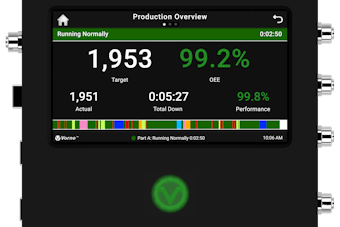It has been more than three years since President Barack Obama signed into law historic food safety legislation—the FDA Food Safety Modernization Act (FSMA). The law has two major themes: prevention and accountability. Prevention means that food companies need to have controls in place during manufacturing to assure the safety of their products and to prevent problems (not just react to them after the fact). Accountability means that food companies are accountable to the Food and Drug Administration (FDA) to help ensure that their suppliers are making safe ingredients.
Although the law primarily has significant implications for food manufacturers, importers, and the fresh produce industry, it also affects the food packaging industry. Importantly, not all provisions in FSMA apply to food packaging in the same way. Some provisions of the new law make food packaging manufacturers accountable to the FDA, while other provisions make food packaging manufacturers accountable to their customers. In order to help keep everything straight, I encourage you to think about a few key principles as you read on.
-
First, who does the legal requirement apply to? Some requirements apply to “food” as defined in the Federal Food Drug and Cosmetic Act (FFDCA), and others apply to • “registered” food facilities.
-
Second, where is your business in the supply chain? Are you acting as a seller or as an importer/buyer?
-
Third, who cares about your activities? Is it the FDA or your customers (or both)?
There are two major provisions in FSMA that are particularly relevant to food packaging manufacturers and their relationships with their food-industry customers: Preventive Controls and the Foreign Supplier Verification Program. Third-party certification is a tool that may help ease compliance for food packaging companies.
Preventive Controls
The Preventive Controls provision is found in Section 103 of FSMA (FFDCA Section 418). It requires all registered food facilities to evaluate the hazards that could affect food manufactured, processed, packed, or held by the facility, to identify and implement preventive controls to significantly minimize or prevent the occurrence of such hazards, and provide assurances that the food is not adulterated and does not contain any undeclared allergens.
As stated above, this requirement applies to all food facilities registered as required by Section 415 of the FFDCA. By regulation, the FDA has exempted food packaging companies from the registration requirement (it defined “food” to exclude “food contact substances” for registration purposes). This means that these companies are exempt from the legal requirement to comply with the Preventive Controls provision—meaning such companies are not accountable to the FDA. But in practice, they are still accountable to their customers.
Although food packaging manufacturers are exempt from the Preventive Controls provision, in all likelihood their customers—food facilities that use packaging materials to wrap .
The Foreign Supplier Verification Program
The second major provision in FSMA is called the Foreign Supplier Verification Program (FSVP) (FSMA Section 301; FFDCA Section 805). This provision applies to all importers of “food” and requires them to perform risk-based verification activities to ensure that the food they import is produced in compliance with the Preventive Controls provision (if applicable) and is not adulterated or does not contain any undeclared food allergens. There are two definitions that are critical to understanding how this provision may affect your business:
-
First, FSMA defines “importer” as “the United States owner or consignee of the article of food at the time of entry of such article into the United States” or the U.S. “agent or representative of a foreign owner or consignee of the article of food at the time of entry.”
-
Second, for purposes of this section, “food” includes food packaging materials (i.e., food packaging is not exempt here as it was for purposes of facility registration/preventive controls described above).
Therefore, if you are an importer, and you import food packaging materials, FSMA will require you to have an FSVP. If this is confusing, let’s look at our principles again. Who does the legal requirement apply to? Unlike the Preventive Controls provision, which applies to registered facilities, the FSVP applies to all importers of food, whether they are registered or not. Under the FFDCA, the term “food” includes food packaging materials.
Although the FDA exempted food packaging materials from the definition of “food” for purposes of facility registration, that exemption only is an exemption from registration. The basic definition of food in the statute remains.
It is possible the FDA may grant an exemption from the FSVP for importers of food packaging materials in the regulations implementing the provision, as a coalition of trade associations related to the packaging industry has requested of the agency. Specifically, as of this writing, the FDA wrote a proposed rule implementing the FSVP and accepted public comment through January 27, 2014. This provided an opportunity for food packaging manufacturers to comment on the proposed rule to the FDA expressing their support for an exemption. Although the FDA did not propose an exemption in the proposed rule, it is possible that the FDA may grant an exemption in the final rule. So stay tuned.
Third-party certification
Furthermore, there is a tool at your disposal that may help you comply with the FDA’s requirement that you have an FSVP and/or your customer’s requirement that you have preventive controls in place. The tool is third-party certification.
If you are an importer, you can use third-party certification as a verification activity. That is, you can require your suppliers to get certified. Then, meeting the FSVP requirement is much easier. If you are a supplier, you can use third-party certification to show your customers you have rigorous programs in place to ensure safety and quality. You can show your customers you are certified, and then they can more easily satisfy their obligations under FSMA. (Please keep in mind that you are not legally required by the FDA to use third-party certification. I am merely suggesting it as a potential tool for your consideration.)
Conclusion
In the end, the passage of FSMA means that big changes are coming for food companies everywhere, and that applies to makers of food packaging as well. As you think about what you need to do to prepare to come into compliance with the law, be sure you:
-
Understand which provisions apply to registered food facilities (Preventive Controls) and which apply to importers of food (FSVP).
-
Think about what activities you need to engage in to satisfy the FDA (FSVP), and what you need to do to satisfy your customers (Preventive Controls).
-
Think about whether third-party certification makes sense to satisfy both FDA (if applicable) and customer requirements.
About the author: As Associate in the Food and Agriculture Group at the law firm of
Hogan Lovells US LLP in Washington, DC, the author has significant experience with the development and implementation of the FDA Food Safety Modernization Act (FSMA).
For more information, fact sheets, and FSVP process flow diagrams, visit the FDA’s web page, see the FSMA Proposed Rule for Foreign Supplier Verification Programs (FSVP) for Importers of Food for Humans and Animals.About the author: Hogan Lovells US LLPLiked this article? Download the entire Food Safety playbook here. Or, Download the entire Primary playbook here.

























